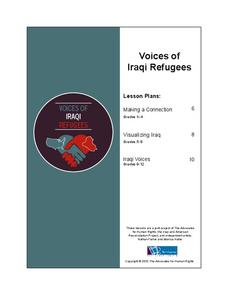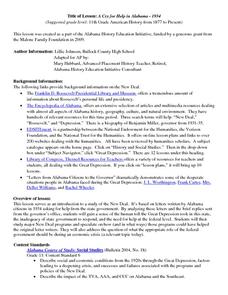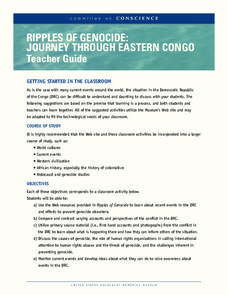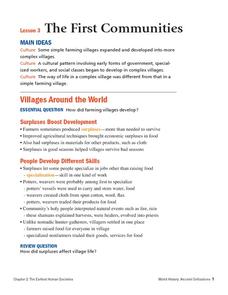Advocates for Human Rights
Voices of Iraqi Refugees
The stated goal of this resource is to provide learners with basic facts about and build empathy for Iraqi refugees. To do so elementary classes develop a plan for how to welcome refugees to their classroom. Middle schoolers read...
Alabama Department of Archives and History
A Cry for Help in Alabama - 1934
What should be the role of the federal government during an economic crisis? That is the question at the center of this introduction to a study of the New Deal. Class members examine letters to the state government asking for help,...
School Improvement in Maryland
Pollution Data
Smog? Vog? What is being done about air pollution? Government classes investigate federal and state programs designed to improve air quality, and then develop a proposal for further actions that are needed.
School Improvement in Maryland
Smart Growth
New roads, new businesses, new developments, new mass transit systems. All growth has both positive and negative effects on communities. Government classes investigate the principles of Maryland's 1997 Smart Growth program and the...
Edible Schoolyard
Pan de los Muertos
Accompany instruction and the celebration of El Dia de los Muertos with a loaf of Pan de los Muertos. Here, scholars measure ingredients precisely to create tasty bread, write a remembrance for someone who has passed away, and take part...
Peace Corps
Community
What is a community? Find out with a activity that sheds light onto the different types of communities—school, local, and global. Scholars read informational text detailing the life of a young girl from Cape Verde and take part in a...
US Holocaust Museum
Ripples of Genocide: Journey through Eastern Congo
Could you locate the Democratic Republic of Congo on a map? Scholars investigate the genocide taking place in Eastern Congo. Groups explore web-based evidence as well as the Ripples in Genocide source to take a closer look at the issue....
North Carolina Consortium for Middle East Studies
Voices from the Trans‐Atlantic Slave Trade
Young historians trace the roots of African slavery and learn about the causes and effects of the Trans-Atlantic slave trade through a PowerPoint presentation and by reading and discussing excerpts from the book Copper Sun.
Orange County Water Atlas
Location, Location, Location…
Young geographers discover not only how to read and recognize coordinates on a map, but also gain a deeper understanding of latitude and longitude and how climate changes can vary significantly across latitudes.
Nemours KidsHealth
Male Reproductive System
Young pupils are introduced to the male reproductive system, the process of reproduction and conception through worksheets, discussion, and instructional guidance.
Global Oneness Project
Relocating Residents: The Impact of Housing on Community
Sama Maydani and Sarah Kuck's film, Even the Walls, that explores the benefits and drawbacks of gentrification in downtown Seattle, asks viewers to consider how houses, apartment buildings, and outdoor spaces can be designed to build a...
American Forest Foundation
Who Speaks for the Trees?
Help young conservationists appreciate the important role that trees play in ecosystems around the world with this collection of six engaging activities. From a shared reading and class discussion of Dr. Seuss' The Lorax, to in an depth...
Library of Congress
Investigating the Building Blocks of Our Community’s Past, Present, and Future
As Ken Jennings said, "There's just something hypnotic about maps." Certainly, the longer you look at them the more you can learn. In this project-based learning instructional activity, individuals study both historic and present-day...
Global Oneness Project
Exploring the Creative Process
Launch a discussion of the creative process with a short video that features the daily ritual of Slobodan Dan Paich, a San Francisco artist. Slobodan models his approach to tea painting and shares his reflections on the creativity.
Global Oneness Project
Clowning Around
Being a clown is hard work — no joke! Emmanuel Vaughan-Lee's Laugh Clown Laugh, a short film about German clown Reinhard "Filou" Harstkotte, asks viewers to consider the various roles played by clowns and to consider the implications of...
Global Oneness Project
Highways and Change
What is the cost of change? Roberto Guerra's photo essay "La Carretera: Life and Change Along Peru's Interoceanic Highway" asks viewers to consider the impacts of the 1,600 mile-long highway through Peru and Brazil that connects Pacific...
University of Minnesota
Beautiful Brain: Brain Inspiration
"Neuroscientists consider Cajal as important to their discipline as Einstein is to physics." The first of four lessons has scholars view Santiago Ramon y Cajal's drawings of neurons. They reflect and respond to the art through writing...
Library of Virginia
Life as an Enslaved People
As part of a study of slavery in the United States, class members analyze documents related to the sale of slaves. They consider not only the text of the bills of sale but also what the appearance of the broadsides suggest.
Houghton Mifflin Harcourt
The First Communities
These documents list essential questions and foundational concepts associated with early civilizations and farming communities in the agricultural revolution. Use this as a starting point for developing specific lessons and activities...




















